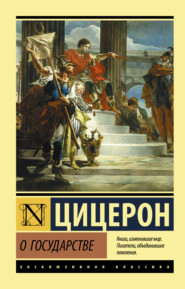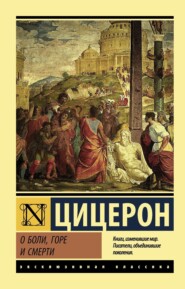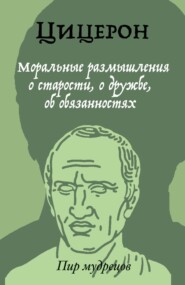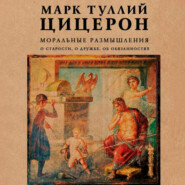По всем вопросам обращайтесь на: info@litportal.ru
(©) 2003-2024.
✖
The republic of Cicero
Автор
Год написания книги
2018
Настройки чтения
Размер шрифта
Высота строк
Поля
VIII. * * * But the other has filled four pretty large books with the subject of justice. From Chrysippus I have never looked for any thing very great or magnificent; since he reasons in a particular way of his own, and examines things rather by the force of words, than the weight of facts. It was for those distinguished men, to raise up that prostrate virtue, and elevate it to the divine heights of wisdom. A virtue which stands alone as it were, greatly munificent and liberal; which loves every thing better than itself, and is born more for others, than for its own interests. Nor was the inclination wanting to them: for what other cause had they for writing, or what motive soever? In genius they excelled all. But the cause was greater even than their inclination and strength. The right indeed concerning which we inquire, is something civil, not natural: if it were, justice and injustice would be the same things to all men, as hot and cold, bitter and sweet things are.
IX. Now however, if any one borne upon the chariot with winged serpents, of which Pacuvius speaks, could survey with his eyes, and look down upon the many and various nations and cities; he might see chiefly among that unchanging race of the Egyptians, which preserves in its records the memory of so many events and ages, an ox esteemed as a god, which the Egyptians call Apis; and many other strange things among them, among which wild beasts consecrated into the number of the gods. Then in Greece, where as with us, magnificent temples are consecrated containing human images, which the Persians considered impious. For which cause alone, Xerxes is said to have ordered the temples of the Athenians to be burnt; considering it to be wicked to shut the gods up within walls, whose residence was the whole universe. Afterwards Philip who had it in contemplation, and Alexander who carried it into effect, gave as reasons for making war against the Persians, that they avenged the temples of Greece; which the Greeks did not think of repairing, that the devastation might be an eternal monument to posterity of the infamy of the Persians. How many, as the Taurians in Axinum, as Busiris the king of Egypt, as the Gauls, the Carthagenians, have thought it a grateful and pious duty to the gods, to immolate men. But the institutions of life differ so much, that the Cretans and Etolians esteem it honourable to steal: the Lacedemonians used to say that all lands were theirs which they could reach with a shaft. The Athenians were wont to swear even publicly, that every soil was theirs, which produced oil and corn. The Gauls consider it shameful to produce grain by labour, and therefore go armed to harvest other people’s lands. But we, the most just of men, to make our own olive and vineyards more valuable, do not permit the transalpine nations to plant them: in doing which we are said to act prudently; it is not called acting justly. By which you may understand there is a wide distance between prudence and equity. Lycurgus, the founder of the best laws, and the most equal rights, gave the lands of the wealthy to be cultivated by the lower class in the state of servitude.
X. But if I were to describe the various kinds of laws, of institutions, of customs and manners, not only so different among such divers nations, but even in a single city, or in this, I could demonstrate them to have been changed a thousand times. Our friend Manilius here, an interpreter of laws, will tell you that other laws exist now concerning the legacies and inheritances of women, than those he was wont to speak of in his youth, before the Voconian law was passed; which very law, indeed proposed for the advantage of the men, is full of injustice towards the women. For why should a woman not have possessions? Why should a vestal appoint an heir, and her mother not? Why if limits were to be put to the possessions of women, should the daughter of Crassus, if she were an only daughter, possess thousands legally, when mine could not possess two or three hundred * * * * * *
[Two pages wanting.]
XI. * * * * * * If these rights were thus sanctioned in us, all men would have the same rights, and would not have different rights at different periods. But if it is the duty of a just and good man to obey the laws, I would ask which are they to be? Or shall he obey all indiscriminately? But virtue does not admit of uncertainty, nor nature endure inconstancy. The strength of law consists in punishment, not in our natural justice. Natural right therefore does not exist. Whence it follows, that men are not made just by nature. But it is said, although there are various laws, still good men, by natural inclination, pursue what is just in itself, and not what is assumed to be so; because it is the part of a good and just man, to render that justice to every one which he is deserving of. Now, first, are we in any wise just to the dumb beasts? For men, not of mediocrity, but great and learned; Pythagoras and Empedocles, declare that all animals possess the same degree of right, and denounce unatoning punishments to hang over those by whom any animal is outraged. It is wicked therefore to injure the brutes. * * * * * *
[Eight pages wanting.]
XII. * * * * * * what we call wisdom, urges us to increase our wealth, our riches, and to extend our possessions. How could that great commander[21 - Alexander.] who formerly carried the limits of his empire into Asia; how could he govern, bear sway, reign, have dominion, and the full enjoyment of voluptuousness, unless he took something from others? But justice orders us to spare all, to consult the welfare of mankind, to give to every one his own, and to abstain from every thing that is sacred, every thing that is public, every thing which is not our own. What therefore is to be done? If wisdom is consulted, riches, power, wealth, honours, authority, empire, are open to individuals and nations. But since it is the public interest we are discussing, instances of a public nature will illustrate better; and as the same degree of right is in both, I shall advert to the wisdom of a nation, and I shall omit the rest. Our own nation, which Africanus in his discourse yesterday, traced to its origin, whose empire already extends over the earth, has it, once least of them all, become so by justice or wisdom? * * * * * *
[Four or eight pages wanting.]
XIV. For all who possess the power of life and death over a people are tyrants, yet they prefer to be called kings by the name of the good Jupiter. When certain persons through the influence of their riches, their class, or other circumstances, possess themselves of the government, it is a faction. Yet they call themselves, the better class. If the people however are uppermost and rule every thing at their own pleasure, that is called liberty; nevertheless it is licentiousness. But when one fears another, man mistrusting man, and one class another, then because no one confides, a sort of pact is made between the people and the great, from whence that combined form of government springs, which Scipio has praised. So that neither nature, or the will is the mother of justice, but weakness. For when one thing is to be chosen out of three, either to do injustice without permitting it to be done to you; or to do it and permit it also; or neither one or the other: the best is to do it with impunity[22 - These are sophisms brought forward in favour of injustice.Vide Lact. Inst. 5.] if you can; the second best is neither to do it, nor suffer it to be done to you: the worst of all is to be eternally fighting now on account of your own aggressions, now on account of those of others * * * * *
[An unknown number of pages wanting.]
* * * Except the Arcadians and the Athenians, who, I suppose, fearing lest at some period this decree[23 - To restore things unjustly acquired.] of justice might appear, have feigned themselves to be sprung from the earth, like the little mice we see in the fields.
XVI. To these things, others are wont to be added principally by those, distinguished for their honesty in discussion, and having more weight for that reason. Who when engaged in the inquiry of what constitutes a good man, frank and plain as we wish to find him, are not themselves crafty, hardened, and malicious in argument. They deny that the wise man is good only because goodness and justice are pleasing to him from their nature; but because the lives of good men are free from apprehension, care, solicitude and danger. Whereas bad men have always a sting goading their souls, and judgment and punishment are always present to their eyes. That there is no emolument, no advantage arising from injustice, so great as to compensate the fear, and the constant thought that some punishment is impending * * * * *
[Four or eight pages wanting.]
XVII. I ask if there be two men, one of them of the very best kind; equitable, perfectly just, of exemplary faith: the other singular for his wickedness and audacity: and suppose the community in such an error, that the good man passes for a wicked and dishonest one; while the bad one has the reputation of perfect probity and good faith. And through this general delusion of the citizens, the good man is harassed, arrested, bound, his eyes put out, condemned, thrown in chains, tortured in the fire, banished. Wanting every thing, at last he appears to all to be deservedly the most wretched of men. On the other hand, the bad man is praised, sought after, caressed by all. Honours of every kind, authority, power, and every advantage conferred upon him from all sides. A man, finally, in the estimation of all deemed the very best, and worthy of the highest gifts of fortune. Who would be so insane as to hesitate which of these two he would choose to be?
XVIII. As it is with individuals, so it is with nations. No community is so stupid, as not to prefer commanding by injustice, to serving according to justice. I shall not go far back for examples. Being consul, you assisting me in council; I had to examine the Numantine treaty. Who is ignorant that Pompey made that treaty, and that Mancinus was concerned in the same affair? This last most excellent man supported the proposition I carried from the consultation in the senate; the other most earnestly opposed it. Those who valued modesty, integrity, and good faith preferred Mancinus: yet for his reasoning, counsel, and policy, Pompey took the lead of him * * * *
[An unknown number of pages wanting.]
XXIX. * * * * * Ti. Gracchus was vigilant for the interests of the people, but neglected the rights of the Latins and the treaties with the allies. If such customs and license should spread themselves wider, and our empire be changed from right to force, so that those who until now voluntarily obey us, should be ruled only by terror; although it has been vigilantly preserved for us, who are of the present age; yet I should be very solicitous about our posterity, and about the immortality of the republic, which might be perpetual, if the institutions and manners of our forefathers were preserved.
XXX. When Lælius had thus spoken, all present expressed themselves to have been very much delighted by him, but Scipio, among the rest, as if quite elated with pleasure, “many causes,” said he, “indeed Lælius, hast thou often defended, in such a manner that I can by no means compare our colleague Servius Galba to thee; whom when he lived thou preferredest to all; nor in truth any of the attic orators * * *
[Twelve pages wanting.]
XXXI. * * * * * Therefore that common interest, that is the commonwealth, who can recognize it when all are oppressed by the cruelty of one; when no bond of Law exists, nor that consent of congregated society, which constitutes a people. And this very condition of the Syracusans: a celebrated city, as Timæus says, the first among the Greeks, and the most beautiful of them all: its harbour embosomed within the walls, its canals running through the city: its broad streets, its porticoes, temples, fortifications, all these did not help to constitute a commonwealth, while Dionysius reigned. The people had no part in them, for the very people belonged to one man. Therefore where there is a tyrant, it is not a vitiated commonwealth, as I said yesterday, but reason compels us to declare plainly that no commonwealth at all exists.
XXXII. “Indeed” said Lælius, “you speak very clearly, and I already perceive the drift of your discourse.
S. You see therefore, that when every thing is in the power of a faction, neither can that be properly called a commonwealth.
L. I judge it plainly so.
S. And most rightly do you judge, for what was the condition of the Athenians, when after that great Pelopponesian war, thirty men were most unjustly placed in the command of that city? Did the ancient glory of the city, the admirable nature of its buildings, its theatre, gymnasia, its noble porticoes, its citadel, or the admirable works of Phidias, or the magnificent port of Piræus, did they constitute a commonwealth? “Not in the least” said Lælius, “because indeed the common interest was not thought of.”
S. How was it at Rome, when the Decemvirs existed without appeal, in that third year, when liberty itself had parted with its privileges?
L. Nothing was left to the people, and truly it was necessary to bring them to that point, that they might recover their rights.
XXXIII. S. I come now to the third kind, that in which some inconsistency will perhaps be perceived, where all things are said to be done by the people, and to be in the power of the people. When the multitude orders punishments to be inflicted in any manner that it pleases, ordering, seizing, keeping, dissipating every thing whatever they choose, can you then Lælius, deny that to be a republic, where all things belong to the people, and when indeed we define a republic to be a commonwealth?” “There is nothing,” said Lælius, “I would sooner deny to be a republic, than where all things are in the power of the multitude. We did not consider that they had a republic among the Syracusans, or at Agrigentum, or at Athens when they were under tyrants, or at Rome when under the decemvirs. Nor do I see how the name of republic is appropriate when the multitude rules. Because first, as you have happily defined it to me, Scipio, a people does not exist, but where it is held together by consent of law; and this sort of mob, is as much a tyrant as if it were one man. Indeed it is more mischievous, for nothing is more ferocious than the wild beast which assumes the name and form of the people. Nor is it right, when the property of maniacs is placed by law under the guardianship of kindred, that * * *
[Eight pages wanting.]
XXXIV. * * * of it,[24 - The better class.] it may with as much propriety be said that it is a republic and a commonwealth, as it may be said of a kingdom. “And much more,” said Mummius, “for a king being one, is more like a master; but where many good men are at the head of affairs in a republic, nothing can be more happily constituted. But I certainly prefer a kingdom to the sway of a democracy; which third and most vicious kind of government remains for you to explain.”
XXXV. To this Scipio replied, “I recognize well Spurius, your steady aversion to the popular mode, and although it might be treated with less aversion than you are wont to do, nevertheless I agree, that of all these three kinds, no one is less to be approved of. I do not however agree with you that the better class are to be preferred to a king; for if it is wisdom which governs a state, of what consequence is it, whether it resides in one, or in many? But in our discussion we are led into a sort of error. When we call them the better class, nothing can be conceived more excellent, for what can be imagined more desirable than the best? When however a king is mentioned, an unjust king occurs to our minds. We do not nevertheless intend to speak of an unjust king, in our examination of this royal kind of government. Think of Romulus, Pompilius, and Tullus as kings, and perhaps you will not be so displeased with that kind of government.
M. What sort of praise then is left for a democratic government?
S. What did you think, Spurius, of the Rhodians, with whom we were together; did you see nothing like a commonwealth there?
M. Indeed I did, and least of all to be blamed.
S. You say well. But if you remember all were alike; sometimes plebeians, sometimes senators; and by turns discharging during certain months their functions as senators; the other months they remained in the ranks of the people. In both capacities however they had the privilege of being present at the meetings for deliberation, and equally in the theatres and in the courts, great matters and all others were judged; so numerous was the multitude and so great its power that * * * * *
BOOK IV
II. * * * * * * How conveniently the orders are set down; the ages, the classes. The equestrian order where the senate votes. Too many foolishly seek to abolish that useful institution, hoping that through some Plebecists procuring the sale of the horses, they may get a largess.
III. Look now at the other provisions so wisely made, that the citizens may enjoy a happy and honest state of society, for that is the very motive for their union; and which government ought to secure to men, by institutions and laws. In the first place, as to puerile discipline for free-born young men, respecting which the Greeks have laboured so much in vain; and the only matter about which our guest Polybius reproaches the negligence of our institutions. No defined system, or of a public nature, or uniform for all, was decreed by the laws.
[Four or eight pages wanting.]
IV. * * * * * * nor naked when at an age of puberty. So deep did they seek as it were to lay the foundations of modesty. But how absurd the exercises of youth in the Grecian Gymnasia; how trifling that drilling of young boys: what loose and unrestrained manners permitted to them. I say nothing of the Eleans and Thebans, among whom free license and permission was given to the young people to indulge in sensuality. The Lacedemonians too, when they allowed every sensual indulgence short of violence, among their youth, were destroying what they were granting such a slight protection to. “I clearly understand, Scipio,” said Lælius, “that in these practices of the Greeks, which you reprehend, you had rather attack the most illustrious people, than your favourite Plato, whom you do not assail at all, especially * * * * *
BOOK V
II. * * * * * * No prerogative more royal than the administration of justice, in which was comprehended the expounding of rights, for individuals were accustomed to seek justice from kings. On which account the lands, the fields, the groves, the extensive and rich grazing districts were defined, which belonged to the sovereign, and were all managed without any care or labour on his part; that none of the cares of private business, might abstract him from the affairs of the public. Nor was any man an umpire or arbitrator of any legal contention, but all things were decided by royal judgments. And it seems to me, that our Numa chiefly adopted this ancient custom from the kings of Greece. For the others, although they also discharged this function, yet a great many of them waged wars, and occupied themselves in establishing the rules of war. But that long peace of Numa, was the parent of law and religion to this city. He also was the writer of those laws which you know to be extant: all which is appropriate to the very citizen whose character we are drawing * * * * * *
[An unknown number of pages wanting.]
III. S. Do you think there is any harm in his being acquainted with the nature of roots and seeds?
M. None, if only his work is not neglected.
S. But do you think it to be properly the study of a farmer?
M. Not in the least; for the cultivation of the land would often be unattended to.
S. Therefore, as a farmer is acquainted with the nature of his soil, a steward with the nature of letters, and each can turn from the amusement of theory to the greater utility of practice; so this our ruler may be thoroughly conversant with the knowledge of rights and of laws; he may have looked even into the very fountains of them: but let not his consultations, his constant readings, and his writings occupy him too much; but let him be as it were both steward and farmer to the commonwealth. Let him be skilled in the principles of law without which no man can be just; let him not be ignorant of civil law: but let it be as the pilot who studies the stars; the physician who studies the nature of plants and minerals; each turning his knowledge to the benefit of his art, without permitting it to impede the practical use of his vocation * * *
[An unknown number of pages wanting.]
IV. * * * * In those states where the good look for praise and honour, and fly from ignominy and disgrace. Not so much restrained by apprehension of the penalties established by law, but by a sentiment of self-respect, which nature has planted in man, a sort of dread of deserved censure. This sentiment the ruler of a state strengthens by public opinion, and confirms by education, and by institutions, that shame may deter the citizen from crime as much as fear. But these considerations properly belong to renown, and shall be more abundantly considered.
V. Life, however, and the comfortable enjoyment of it, are constituted by legal marriages, lawful children; the keeping hallowed the seats of the penate gods, and the domestic lares; that all may enjoy public and private comforts. Without good government, private life cannot be agreeable, nor can any one be more happy than in a well regulated state * * * *














